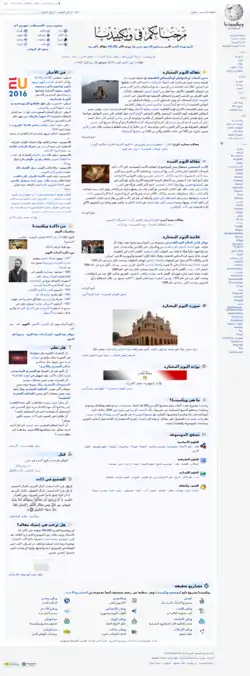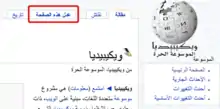Arabic Wikipedia
The Arabic Wikipedia (Arabic: ويكيبيديا العربية) is the Arabic language version of Wikipedia. It started on 9 July 2003. As of February 2021, it has 1,101,573 articles, 2,015,574 registered users and 38,731 files and it is the 16th largest edition of Wikipedia by article count, and ranks 8th in terms of depth among Wikipedias. It was the first Wikipedia in a Semitic language to exceed 100,000 articles[2] on 25 May 2009, and also the first Semitic language to exceed 1 million articles, on 17 November 2019.[3]
 | |
Screenshot  Main Page of the Arabic Wikipedia in May 2016 | |
Type of site | Internet encyclopedia project |
|---|---|
| Available in | Arabic |
| Headquarters | Miami, Florida |
| Owner | Wikimedia Foundation |
| Created by | Arab wiki community |
| URL | ar |
| Commercial | No |
| Registration | Optional |
| Launched | 9 July 2003[1] |
The design of the Arabic Wikipedia differs somewhat from other Wikipedias. Most notably, since Arabic is written right-to-left, the location of links is a mirror image of those Wikipedias in languages written left-to-right. Before Wikipedia was updated to MediaWiki 1.16, Arabic Wikipedia had a default page background of the site inspired by Arabic/Islamic tiling or ornament styles. Switching from MediaWiki's new default Vector layout to the original MonoBook layout may restore this page background.

History

At the emergence of the Wikipedia project in 2001, there were calls to create an Arabic domain raised by Arab engineers.[4] The domain was created as "ar.wikipedia.org" but no serious activity took place except with anonymous users who experimented with the idea.[5] Until 7 February 2003, all contributors to the Arabic Wikipedia were non-Arab volunteers from the International Project Wikipedia[6] that handled the technical aspects. Elizabeth Bauer, who used the user name Elian in the Arabic Wikipedia, approached many Arabic speakers who potentially might be interested in volunteering to spearhead the Arabic project. The only group who responded was the ArabEyes team who were involved in Arabizing the Open Source initiatives. Elian's request was conservatively received and the ArabEyes team was ready to participate but not take a leadership role[7] and then declined to participate on the second of February 2003. During this negotiation time, volunteer users from the German Wikipedia project continued to develop the technical infrastructure of the Arabic Wikipedia backbone.[8][9]
In 2003 Rami Tarawneh (Arabic: رامي عوض الطراونة), a Jordanian PhD student in Germany who originated from Zarqa, encountered the English Wikipedia and began to edit content. Contributors encouraged him to start an Arabic Wikipedia.[10] The Arabic Wikipedia opened in July 2003.[11] By that year a significant group of contributors included Tarawneh and four other Jordanians studying in Germany.[10]
On 7 February 2004,[12] one member from the ArabEyes, Isam Bayazidi (Arabic: عصام بايزيدي), volunteered with 4 other friends to be involved with the Arabic Wikipedia and assumed some leadership roles. In 2004, Bayazid was assigned the SysOp responsibilities and he, with another 5 volunteers, namely Ayman, Abo Suleiman, Mustapha Ahmad and Bassem Jarkas[13] are considered to be the first Arabs to lead the Wikipedia project and they are attributed for working on translating and enforcing the English policies to Arabic. The Arabic Wikipedia faced many challenges at its inception. In February 2004, it was considered to be the worst Wikipedia project among all other languages. However, in 2005, it showed phenomenal progress by which in December 2005, the total number of articles reached 8,285.[14] By that time, there were fewer than 20 contributors and the administrators and contributors made efforts to recruit new users.[10]
In 2007 the secret police in an unspecified country detained Tarawneh and demanded that he reveal the IP address of a contributor. To protect the Wikipedian, the administrators forged a dispute that was the presumed reason for Tarawneh losing his administrator access, so the secret police was unable to obtain the IP. In response to the incident, the rules now state that no one user may have access to all information about the Wikipedia's users.[10]

In 2008 the Wikipedia had had fewer than 65,000 articles and was ranked No. 29 out of the Wikipedias, behind the Esperanto Wikipedia and the Slovenian Wikipedia. Noam Cohen of The New York Times reported that, to many of the attendees of the 2008 Wikimania conference in Alexandria, Egypt, the "woeful shape of the Arabic Wikipedia has been the cause of chagrin."[15] Cohen stated that out of Egyptians, fewer than 10% "are thought to have internet access" and of those with internet access many tend to be knowledgeable in English and have a preference of communicating in that language.[15] The Arabic Wikipedia had 118,870 articles as of 15 January 2010.
As of July 2012 there are around 630 active Arabic Wikipedia editors around the world. Ikram Al-Yacoub of Al Arabiya says that this is "a relatively low figure."[16] At the time there were hundreds of thousands of Wikipedia articles on the Arabic Wikipedia.[10] The Wikimedia Foundation and the nonprofit group Taghreedat established the "Arabic Wikipedia Editors Program" intended to train users to edit the Arabic Wikipedia.[16] By the end of June 2014, the number of articles had reached 384,000[17]
Iraqi volunteers have translated much of English Wikipedia into Arabic Wikipedia.[18]
Blocking
The Arabic Wikipedia has been blocked in Syria with no official reasons given by the Syrian government.[19] The block began on 30 April 2008 while all other language versions of Wikipedia remain unblocked and freely accessible. Wikimedia.org has also been blocked, which causes all images on Wikipedia (in all languages) to be unavailable. Tarawneh stated that wasta was used to unblock Wikipedia in Syria.[10]
Evaluation and criticism

In June 2016, Arabic Wikipedia scored 233 in terms of depth (a very rough indicator of the encyclopedia's quality). This is better than the German version (102), the French version (207) or the Japanese version (74), making it the fifth highest +100,000 articles Wikipedia in the terms of depth, after English Wikipedia (930), Serbo-Croatian Wikipedia (561), Thai Wikipedia (253) and Hebrew Wikipedia (251).[20]
At Wikimania 2008, Jimmy Wales argued that high-profile arrests like those of Egyptian blogger Kareem Amer could be hampering the development of the Arabic Wikipedia by making editors afraid to contribute.[21]
In 2010, Tarek Al Kaziri, from Radio Netherlands Worldwide, believed that the Arabic Wikipedia reflected the Arabic reality in general. Low participation lowers the probability that the articles are reviewed, developed and updated, and political polarisation of participants is likely to lead to biases in the articles.[22]
According to Alexa Internet, on 26 November 2014, the Arabic Wikipedia is the 10th most visited language version of Wikipedia in terms of percentage of visitors on all of the Wikipedias over a month, with the "ar.wikipedia.org" subdomain attracting approximately 1.8% of the total visitors of the "wikipedia.org" website,[23] despite being ranked no. 22 in term of the article count. In terms of page views, it is ranked 12th with the same 10 Wikipedias above it plus the Polish and Dutch ones.[24]
In mid-2020, Arabic Wikipedia was criticized for deletion of the article about Sarah Hegazi. Some Arabic LGBT activists on social media accused Arabic Wikipedia of bias against the Arab LGBT community, and considered the action to be part of censorship, hate-speech and homophobia in Middle East. The news website Raseef22 criticized Arabic Wikipedia's policies, and said that the project was controlled by prejudiced administrators who reject articles about minorities and women.[25][26]
Usage and page views by country
Florence Devouard, the former president of the Wikimedia Foundation, stated in 2010 that the largest number of articles on the Arabic Wikipedia were written by Egyptians and that the Egyptians were more likely to participate in the Arabic Wikipedia compared to other groups.[27]
June 2018
| Rank | Country | % of views |
|---|---|---|
| 1 | Saudi Arabia | 22.3% |
| 2 | Egypt | 12.9% |
| 3 | Morocco | 10.4% |
| 4 | United States | 7.1% |
| 5 | Algeria | 7.0% |
| 6 | Iraq | 5.3% |
| 7 | Jordan | 3.7% |
| 8 | Kuwait | 3.0% |
| 9 | United Arab Emirates | 2.9% |
| 10 | Syria | 2.2% |
As a percent of total Wikipedia views
| Rank | Country | % of views 1 June 2018 - 30 June 2018[29] |
|---|---|---|
| 1 | Algeria | 42.5% |
| 2 | Bahrain | 30.3% |
| 3 | Chad | 21.7% |
| 4 | Egypt | 60.5% |
| 5 | Iraq | 67.9% |
| 6 | Israel | 3.2% |
| 7 | Jordan | 67.9% |
| 8 | Kuwait | 48.2% |
| 9 | Lebanon | 28.8% |
| 10 | Libya | 74.3% |
| 11 | Mali | 2.7% |
| 12 | Mauritania | 50.9% |
| 13 | Morocco | 45.3% |
| 14 | Niger | 3.6% |
| 15 | Oman | 43.9% |
| 16 | Palestine | 73.7% |
| 17 | Qatar | 20.5% |
| 18 | Saudi Arabia | 68.6% |
| 19 | Senegal | 1.8% |
| 20 | Somalia | 11.1% |
| 21 | South Sudan | 12.5% |
| 22 | Sudan | 73.8% |
| 23 | Syria | 77.2% |
| 24 | Tunisia | 26.8% |
| 25 | Turkey | 3.6% |
| 26 | United Arab Emirates | 12.2% |
| 27 | Yemen | 85.5% |
Milestones
- Arabic Wikipedia was launched in September 2001, yet due to MediaWiki software migration, the oldest surviving edit dates back to 9 July 2003.
- Article number 10,000 was نكاف (Mumps) created on 25 December 2005.
- Article number 50,000 was جامعة تكساس مدرسة الطب في هيوستن (University of Texas Medical Branch) created on 31 December 2007.
- Article number 75,000 was قائمة الصحاري حسب المساحة (List of deserts by area) created on 30 August 2008.
- Article number 100,000 was المعهد العالي للفنون والحرف بقابس (University of Gabès) created on 25 May 2009.
- Article number 200,000 was الجوازع (إب) (A village in Yemen) created on 21 October 2012.
- Article number 250,000 was جانيت جاينور (Janet Gaynor) created on 6 December 2013.
- Article number 400,000 was فيض الله قيقلك (A Turkish politician) created on 17 December 2015.
- Article number 500,000 was أولاد بن كانة (تينزي 1) (A village in Morocco) created on 6 March 2017.
- Article number 600,000 was دارين براتلي (Darren Pratley) created on 12 September 2018.
- Article number 700,000 was ريتشارد ك. لي (Richard C. Lee) created on 6 March 2019.
- Article number 750,000 was شيري روبرتسون (Sherry Robertson) created on 12 April 2019.
- Article number 800,000 was هوغو راسموسن (Hugo Rasmussen) created on 26 April 2019.
- Article number 850,000 was رودريغو كونتريرز (Rodrigo Contreras) created on 30 June 2019.
- Article number 900,000 was كينزو سوزوكي (Kenzo Suzuki) created on 13 July 2019.
- Article number 950,000 was ماركوس أندريس لوبيز (Marcos Andrés López) created on 11 September 2019.
- Article number 1,000,000 was ألم العصعص (Coccydynia) created on 17 November 2019.
Gallery
Logos in different fonts for Arabic Wikipedia:
See also
References
- Ahmad, Abdullah (September 2013). "Arabic Wikipedia: Why it lags behind". Asfar e-Journal. London, UK. ISSN 2055-7957. Retrieved 23 December 2014.
- "Wikimedia News/2009 - Meta". meta.wikimedia.org. Retrieved 18 November 2019.
- "Wikimedia News - Meta". meta.wikimedia.org. Retrieved 18 November 2019.
- "المستشار / طارق قابيل". Archived from the original on 5 December 2014. Retrieved 4 August 2014.
- Archived discussions about International languages. Refer to section "Provisional is Best, Sort by Population". Note the comment "Outside jokes, the french an german wikipedias is more developed than the one of hindi or Arab.". Last accessed 4 August 2014
- "arabic wikipedia".
- "We have a problem!".
- "ويكيبيديا:الميدان". 1 August 2003 – via Wikipedia.
- The discussion page of Svertigo that shows the non-Arab volunteers working on the Arabic Wikipedia in late 2003
- Su, Alice (14 February 2014). "In the Middle East, Arabic Wikipedia is a flashpoint – and a beacon". Wired. Condé Nast. Retrieved 14 February 2014. (Archive)
- Panović, Ivan (University of Oxford Faculty of Oriental Studies). "The Beginnings of Wikipedia Masry." al-Logha Series of Papers in Linguistics, 2010. 8: 93-127. (sourced content from p. 94)
- "X!'s tools".
- These were Ayman, Abo Suleima, Mustapha Ahmad and Bassem Jarkas
- Wikipedia Statistics - Arabic Wikipedia. Accessed on 4 August 2014
- Cohen, Noam (21 July 2008). "In Egypt, Wikipedia is more than hobby". International Herald Tribune. Retrieved 14 December 2008. (Archive)
- Al-Yacoub, Ikram. "‘Taghreedat’ to offer Arab Tweeps their own search engine." (Archive) Al Arabiya. Thursday 19 July 2012. Retrieved on 24 August 2012.
- Wikipedia Statistics Arabic. Retrieved on 4 August 2014
- Cuthbert, Olivia (8 October 2019). "Spread the word: the Iraqis translating the internet into Arabic". The Guardian.
- (in Arabic) ويكيبيديا يختفي عن صفحات الانترنت السوري Archived 21 June 2019 at the Wayback Machine
- "List of Wikipedias - Meta".
- Noam Cohen (17 July 2008). "Wikipedia Goes to Alexandria, Home of Other Great Reference Works". The New York Times. Retrieved 29 June 2012.
- "Archived copy" ويكيبيديا والعرب: خلل في المشروع أم في الثقافة؟ (in Arabic). Archived from the original on 10 October 2013. Retrieved 8 July 2011.CS1 maint: archived copy as title (link)
- "Wikipedia.org Traffic, Demographics and Competitors - Alexa".
- "Wikimedia Traffic Analysis Report - Page Views Per Wikipedia Language - Breakdown".
- Babily, Dima (3 July 2020). "ويكيبيديا وقصة سارة حجازي تثيرويكيبيديا وقصة سارة حجازي تثير الجدل حول المعايير التحريرية وحرية التعبير" [Wikipedia and Sarah Hegazi's story spark controversy over editorial standards and freedom of expression]. BBC Arabic (in Arabic). Retrieved 16 August 2020.
- Allam, Samla (23 June 2020). "بعد حذف صفحة التعريف بسارة حجازي… كيف تُدار "ويكيبيديا العربية"؟" [After the deletion of Sarah Hegazi's article... How is Arab Wikipedia managed?]. Raseef22 (in Arabic). Retrieved 16 August 2020.
- Samir, Amira (December 2009). "Le masri est-il contre l'arabe ?" [Is Masri contrary to Arabic?] (in French). Al-Ahram Hebdo. Archived from the original on 31 January 2014. Retrieved 13 March 2010. () "« Les Egyptiens sont effectivement les plus nombreux à participer dans la Wikipedia arabe, c’est-à-dire que les statistiques montrent que le plus grand nombre d’articles dans la Wikipedia arabe sont envoyés par des Egyptiens.[...]"
- "Page Views Per Wikipedia Language - Breakdown". Wikistats: Wikimedia Statistics. Retrieved 12 September 2018.
- "Wikimedia Traffic Analysis Report - Wikipedia Page Views Per Country - Breakdown". stats.wikimedia.org. Retrieved 12 September 2018.
External links
![]() Media related to Arabic Wikipedia at Wikimedia Commons
Media related to Arabic Wikipedia at Wikimedia Commons
| Arabic edition of Wikipedia, the free encyclopedia |
- (in Arabic) Arabic Wikipedia
- (in Arabic) Arabic Wikipedia mobile version
- Arabic Wikipedia on Facebook

- Arabic Wikipedia on Twitter



